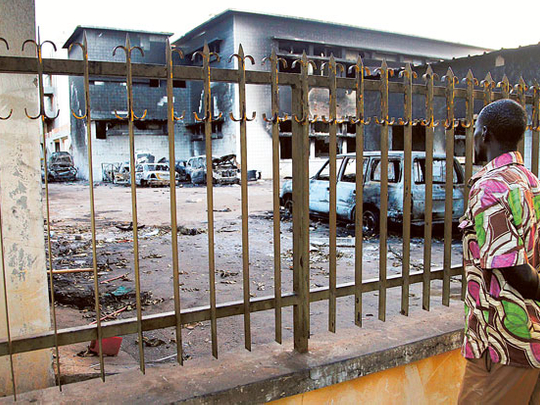
Ouagadougou: The head of Burkina Faso’s military regime promised to deliver a “consensus” leader on Monday in talks on installing a unity government in the West African nation following a violent crackdown on protesters.
The army has stepped into a power vacuum left by Blaise Compaore, who was forced to resign the presidency last week in the wake of violent demonstrations over an attempt to extend his 27-year-rule.
Naming Lieutenant Colonel Isaac Zida as interim chief, the military has said it was acting in the interests of the nation and that “power does not interest us”. But its takeover has sparked angry protests.
Zida was locked in negotiations from 10am (1000 GMT) with diplomats at the foreign ministry, while senior opposition figures were to meet later with their leader Zephirin Diabre.
“The executive branch will be led by a transitional body within a constitutional framework ... This transitional body will be headed by a person appointed by the consensus of all actors in public life,” Zida told the diplomats.
He gave no timetable for the transition but said he wanted a new regime in place within the “shortest possible” period.
The talks built on meetings late Sunday between Zida and the ambassadors of France, the United States and the European Union, although it was not clear if any progress had been made.
The crisis will also be the subject of a meeting of the African Union’s Peace and Security Council later on Monday in Addis Ababa.
Traffic flowed normally in the streets of the capital Ouagadougou after the latest protests on Sunday, with the largest market ending a six-day shutdown and banks open, according to an AFP journalist.
Troops on Sunday had launched a sharp crackdown when several thousand protesters gathered at a rally against the military takeover in the city’s central square.
Some protesters had headed to the national television station headquarters where two opposition leaders made separate attempts to go on air to declare themselves interim chief.
Former defence minister Kouame Lougue — whose name was chanted by thousands in the streets following Compaore’s downfall — told AFP: “The people have nominated me. I came to answer their call.”
But the TV technicians walked out, interrupting transmission, also foiling a bid by Saran Sereme, a former member of the ruling party, to make her claim as leader of the transition.
One person was killed close to the television headquarters where soldiers fired shots in the air to disperse protesters. The army said the victim was likely struck by a stray bullet.
The United Nations, US and EU have joined African leaders in pressing the country’s military top brass to hand power back to civilians.
If the army refuses, “the consequences are pretty clear”, said UN envoy for West Africa Mohamed Ibn Chambas.
“We want to avoid having to impose sanctions on Burkina Faso.”
Hundreds of thousands of protesters, furious at plans to prolong Compaore’s rule in the poor, landlocked country, massed on the streets of Ouagadougou on Thursday, some going on a rampage and setting the parliament and other public buildings ablaze.
Under Burkina Faso’s constitution, the speaker of parliament was supposed to step in as interim head of state. But the army instead named Zida, the second-in-command of the presidential guard, as head of the transitional authority.
Zida, 49, beat an earlier claim to the job by army chief Nabere Honore Traore, winning the military’s endorsement on Saturday.
He said he was appointed to ensure a “smooth democratic transition” and promised to consult with the political opposition and civil leaders.
Opposition figures have said around 30 people have been killed in a week of violent protests. Hospital sources told AFP that there had been at least six deaths, including two by gunshot wounds.
Burkina Faso — known as Upper Volta in its era as a French colony before becoming independent in 1960 and changing its name in 1984 — faces its worst crisis since a wave of unrest three years ago.












